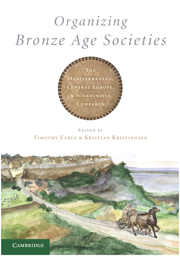Book contents
- Frontmatter
- Contents
- List of Illustrations
- List of Tables
- Preface
- 1 Introduction: Theory and Practice in the Late Prehistory of Europe
- 2 The Palaeo-Environments of Bronze Age Europe
- 3 Regional Settlement Patterns
- 4 Settlement Structure and Organisation
- 5 Households
- 6 Subsistence Strategies
- 7 Technology and Craft
- 8 Organising Bronze Age Societies: Concluding Thoughts
- Appendix 1 Participating Institutions
- Appendix 2 Doctoral Dissertations Based on the Projects
- Appendix 3 Selected Publications Related to the Four Projects
- Bibliography
- Index
- Plate Section
1 - Introduction: Theory and Practice in the Late Prehistory of Europe
Published online by Cambridge University Press: 05 June 2012
- Frontmatter
- Contents
- List of Illustrations
- List of Tables
- Preface
- 1 Introduction: Theory and Practice in the Late Prehistory of Europe
- 2 The Palaeo-Environments of Bronze Age Europe
- 3 Regional Settlement Patterns
- 4 Settlement Structure and Organisation
- 5 Households
- 6 Subsistence Strategies
- 7 Technology and Craft
- 8 Organising Bronze Age Societies: Concluding Thoughts
- Appendix 1 Participating Institutions
- Appendix 2 Doctoral Dissertations Based on the Projects
- Appendix 3 Selected Publications Related to the Four Projects
- Bibliography
- Index
- Plate Section
Summary
We propose to integrate dialectically processual and postprocessual theory to interpret later European prehistory. We approach this daunting task with a comparative, contextualised study of selected microregions from northern Europe to the Mediterranean. Our data derive from fieldwork projects carried out between 1990 and 2006 in Thy in Denmark, Tanum in Sweden, Százhalombatta in Hungary, and Monte Polizzo in western Sicily, supplemented by relevant data from the wider regions (see Preface). Our period encompasses the third to first millennia BC, which saw major transformations that encompassed most of Eurasia (Kristiansen and Larsson 2005; Kohl 2007). Our concern is with the local constructions of these transformative changes, which should provide a new platform for understanding the operation of basic social and economic mechanisms. We wish to transcend the dichotomies between local and global, and external and internal forces of change. Our approach is materialist and multiscalar. The materialist position simply underlines the fact that most of our data were linked to the social and economic reproduction of society, as is apparent from the content of the chapters. Symbolic and ideological forces are, for the time being, given less priority, although they were treated in several works from the project (Oma 2007; Streiffert 2006), and they constantly reverberate in our interpretations. A multiscalar approach implies that we analyse social and economic activities on scales from individual activities within the household, to settlements, to regional polities that are further imbedded in broad international interactions. Although each component, representing a chapter in the book, is analysed on its own terms, we explain operations at one level in terms of the contexts and components of the larger and smaller scales. We seek to integrate results from the three regions into a framework to understand common processes and local histories. It demands theoretical elaboration and conceptualisation, tasks we undertake in the next section.
- Type
- Chapter
- Information
- Organizing Bronze Age SocietiesThe Mediterranean, Central Europe, and Scandanavia Compared, pp. 1 - 33Publisher: Cambridge University PressPrint publication year: 2010
- 4
- Cited by



